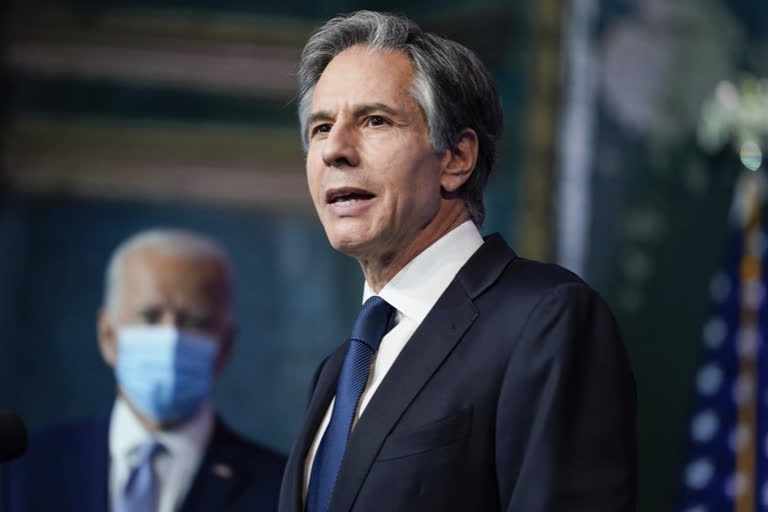Washington: President-elect Joe Biden’s National Security Cabinet may be bare on Day One of his presidency, but an inauguration-eve spurt of Senate confirmation hearings suggests that won’t be the case for long.
The Senate typically confirms some nominees, particularly the Secretaries of Defence, on Inauguration Day, though raw feelings about President Donald Trump four years ago led to Democratic-caused delays, except for James Mattis at the Pentagon. This year, the tension is heightened by Trump’s impeachment and an extraordinary military presence in Washington because of fears of extremist violence.
Putting his national security team in place quickly is a high priority for Biden, not only because of his hopes for reversing or modifying Trump administration policy shifts but also because of diplomatic, military and intelligence problems around the world that may create challenges early in his tenure.
The most controversial of the group may be Lloyd Austin, the recently retired Army general whom Biden selected to lead the Pentagon. Austin will need not only a favourable confirmation vote in the Senate but also a waiver by both the House and the Senate because he has been out of uniform only four years.
Read:|Biden fills out State Department team with Obama veterans
The last time a new president did not have his secretary of defence confirmed by Inauguration Day was in 1989. President George H.W. Bush’s nominee, John Tower, had run into opposition and ended up rejected by the Senate several weeks later.
Also up for confirmation are Alejandro Mayorkas, Biden’s nominee for secretary of the Department of Homeland Security; Biden confidant Antony Blinken to lead the State Department; Avril Haines to be the first woman to serve as director of national intelligence; and Janet Yellen as treasury secretary, another first for a woman.
Austin is testifying Tuesday before the Senate Armed Services Committee, but the panel will not be in a position to vote until he gets the waiver. Republicans are expected to broadly support the Austin nomination, as are Democrats.
Biden’s emerging Cabinet marks a return to a more traditional approach to governing, relying on veteran policymakers with deep expertise and strong relationships in Washington and global capitals. Austin is something of an exception in that only twice in history has a recently retired general served as Defence Secretary — most recently Mattis.
Austin, who would be the first Black Secretary of Defence, retired from the military as a four-star general in 2016. The law requires a minimum seven-year waiting period.
Doubts about the wisdom of having a recently retired officer running the Pentagon are rooted in an American tradition of protecting against excessive military influence by ensuring that civilians are in control. When he announced Austin as his pick in December, Biden insisted he is “uniquely suited” for the job.
Lindsay P. Cohn, an expert on civil-military relations and an associate professor at the U.S. Naval War College, said at a Senate hearing on the subject last week that an Austin waiver raises worrying risks.
“Choosing a recently retired general officer and arguing that he is uniquely qualified for the current challenges furthers the narrative that military officers are better at things and more reliable or trustworthy than civil servants or other civilians,” she said. “This is hugely problematic at a time when one of the biggest challenges facing the country is the need to restore trust and faith in the political system. Implying that only a military officer can do this job at this time is counterproductive to that goal.”
Some Democrats have already said they will oppose a waiver. They argue that granting it for two administrations in a row makes the exception more like a rule. Even so, a favourable vote seems likely.
The chairman of the House Armed Services Committee, Rep. Adam Smith, D-Wash., on Friday introduced waiver legislation for Austin.
Mayorkas, Biden’s nominee for secretary of the Department of Homeland Security, would be the first Latino and first immigrant to lead the agency. That’s notable because DHS oversees border enforcement and the immigration services agency in addition to missions that include overseeing cybersecurity for critical infrastructure and civilian federal agencies.
Haines, a former CIA deputy director and former deputy national security adviser in the Obama administration, was to have appeared Friday before the Senate intelligence committee, but the hearing for her confirmation to be the Director of National Intelligence or DNI, was postponed until Tuesday. She is expected to promise to keep politics out of the intelligence community, a departure from a Trump administration that saw repeated pressure on intelligence officials to shape intelligence to the president’s liking.
Yellen, the nominee for treasury secretary, is certain to be quizzed by the Senate Finance Committee about the details of Biden’s proposed $1.9 trillion emergency relief plan announced last week.
“Without further action, we risk a longer, more painful recession now — and long-term scarring of the economy later,” Yellen says in prepared testimony. She adds that “right now, with interest rates at historic lows, the smartest thing we can do is act big,” saying that in the long run “the benefits will far outweigh the costs.”
AP
Read:|Biden picks geneticist as science adviser, puts in Cabinet
